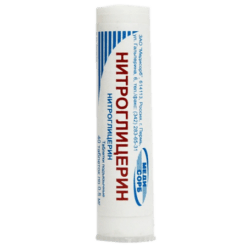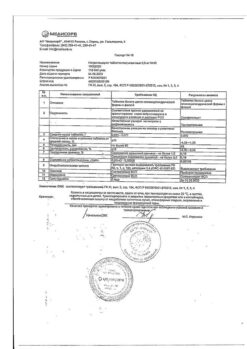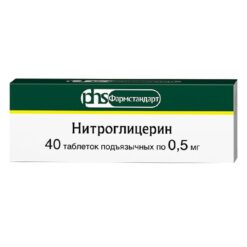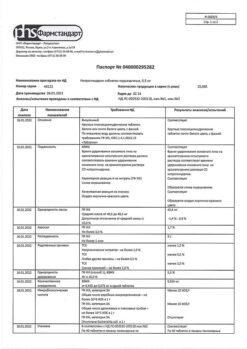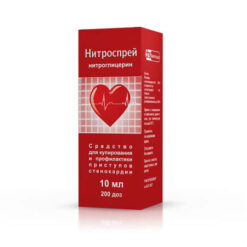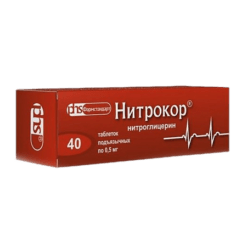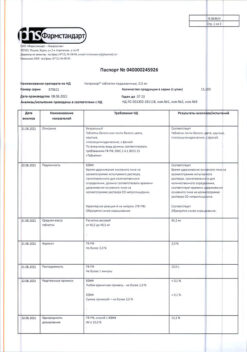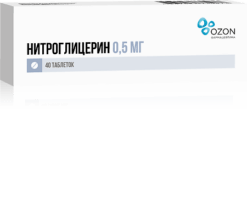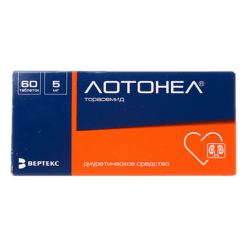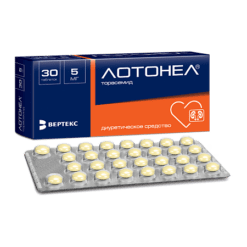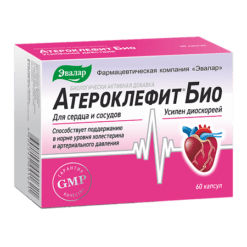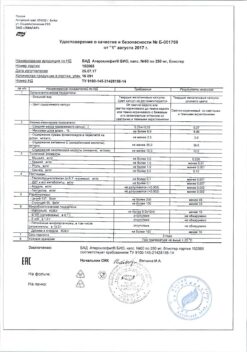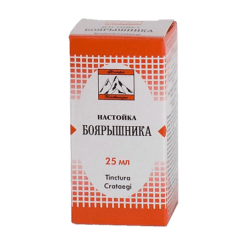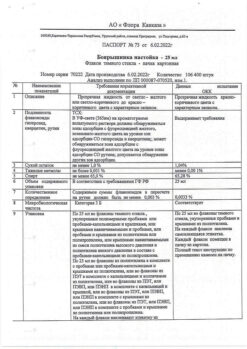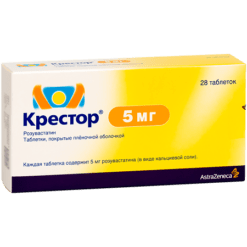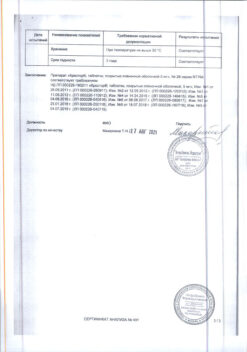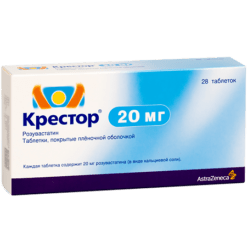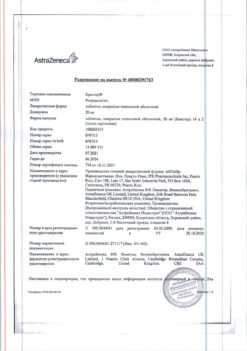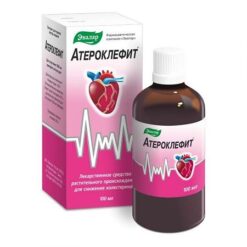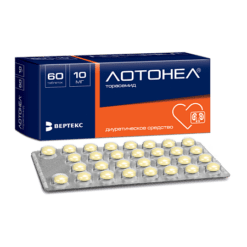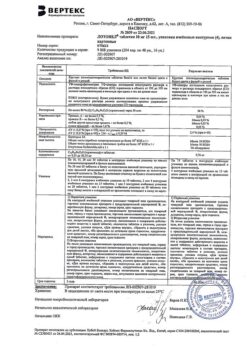No products in the cart.
Nitroglycerin, sublingual spray 0.4 mg/dose 200 doses 10 ml
€1.00
Out of stock
(E-mail when Stock is available)
Description
Nitroglycerin is an organic nitrogen-containing compound with a predominant venodilator effect. The effects of nitroglycerin are due to its ability to release from its molecule nitric oxide, which is a natural endothelial relaxing factor.
Nitric oxide increases the intracellular concentration of cyclic guanosine monophosphatase, which prevents the penetration of calcium ions into the smooth muscle cells and causes them to relax. The relaxation of the smooth muscles of the vascular wall causes vasodilation, which reduces the venous return to the heart (preload) and the resistance of the great circle of circulation (postload). This reduces heart function and myocardial oxygen demand. Dilation of the coronary vessels improves coronary blood flow and helps redistribute it to areas with reduced blood flow, which increases oxygen delivery to the myocardium.
Decreasing venous return leads to decreased filling pressure, improved blood supply to the subendocardial layers, decreased pressure in the small circle of circulation and regression of symptoms in pulmonary edema. Nitroglycerin has a central inhibitory effect on sympathetic vascular tone, depressing the vascular component of pain syndrome formation.
Nitroglycerin also relaxes smooth muscle cells of bronchi, urinary tract, gall bladder, bile ducts, esophagus, small and large intestine and their sphincters. The action of Nitroglycerin when used sublingually starts quickly, the effect develops within 1-1.5 minutes and lasts about 30 minutes.
Pharmacokinetics
Nitroglycerin Spray is rapidly and completely absorbed from the oral cavity into the systemic bloodstream. Bioavailability is 100% when administered sublingually, since “primary” hepatic degradation of the drug is excluded. Cmax in plasma is reached after 4 minutes.
The binding to plasma proteins is 60%. It is quickly metabolized with the participation of nitrate reductase, with the formation of di- and mononitrates (only isosorbide-5-monononitrate is active), the final metabolite is glycerol. It is excreted by the kidneys as metabolites. Total clearance is 25-30 l/min.
After drug administration under the tongue the T1/2 from plasma is 2.5-4.4 minutes. Circulating nitroglycerin is firmly bound to erythrocytes and accumulates in the vascular walls. The main route of excretion of nitroglycerin is extraction of metabolites in the urine; less than 1% of the dose is excreted unchanged.
Indications
Indications
Angina pectoris (control and prevention of attacks, including before exercise).
Active ingredient
Active ingredient
Composition
Composition
1 dose contains
The active ingredient:
Nitroglycerin 400 mcg
Associates:
Ethanol 95% to 40 mg (as a 1% solution).
How to take, the dosage
How to take, the dosage
The drug is recommended to be used as prescribed by the physician in order to avoid complications. At the first signs of an angina attack, depending on the severity, administer Nitroglycerin as follows: preferably in sitting position 0.4-0.8 mg (1-2 doses) by pressing the dosing valve is applied to or under the tongue, while holding the breath at 30-second intervals; then close the mouth for a few seconds. Repeat if necessary, but no more than 1.2 mg (3 doses) for 15 minutes.
If necessary to stop an attack of angina, reapply at 5-minute intervals.
If there is no relief after taking 3 measured doses within 15 minutes, a physician should be consulted.
In prophylactic use, 1 dose 5 to 10 minutes before anticipated exertion or stress.
Please do not shake the package before use and hold it upright and straight in front of you when spraying. Close mouth after each spraying and do not swallow immediately.
The highest single dose is 3 doses.
Each press of the dispensing valve releases one dose (0.4 mg of nitroglycerin) as a spray from the can. Under no circumstances should the spray be inhaled. Before using the cylinder for the first time, fill the dispensing pump by removing the protective cap and pressing the dispensing valve several times until the spray appears. After prolonged non-use of the can, it may be necessary to refill the pump.
Interaction
Interaction
Other vasodilators and hypotensive agents (beta-adrenoblockers, “slow” calcium channel blockers, angiotensin-converting enzyme (ACE) inhibitors), neuroleptics, tricyclic antidepressants, monoamine oxidase inhibitors (MAOIs), type 5 phosphodiesterase inhibitors (including sildenafil and other FDE-5 inhibitors), procainamide and ethanol may increase the hypotensive effect of Nitroglycerin.
Nitroglycerin increases the effect of dihydroergotamine and reduces the effectiveness of heparin, and nitroglycerin increases the serum concentration of dihydroergotamine, thereby increasing its effect.
The administration of acetylsalicylic acid increases the blood level of nitroglycerin and enhances its effects.
Nitroglycerin spray increases the excretion of catecholamines and vanillinic acid in the urine.
Particulars of the effect of the drug when first taken or when it is discontinued:
No information.
Special Instructions
Special Instructions
We should use with caution in orthostatic hypotension, hemorrhagic stroke, severe renal and/or hepatic failure, thyrotoxicosis, alcohol abuse, epilepsy, craniocerebral trauma, closed-angle glaucoma (risk of increased intraocular pressure), migraine, severe anemia. Particular attention and monitoring is required during the therapy of patients prone to develop orthostatic hypotension and in the presence of increased intracranial pressure. The sensitivity to nitrates may vary greatly from patient to patient, which should be taken into account in dosage selection. Increasing the dose may cause tolerance to the drug (addiction).
The drug contains alcohol, which is important for patients with liver dysfunction, alcohol abuse, epilepsy, craniocerebral trauma and other central nervous system diseases, as well as for pregnant women and children. Nitroglycerin may increase the effects of other drugs. If blurred vision or dry mouth persist or are severe, treatment should be discontinued.
The consumption of alcoholic beverages during the use of the drug is strictly prohibited.
During treatment, it is necessary to refrain from driving and engaging in potentially hazardous activities requiring increased concentration and quick psychomotor reactions.
Contraindications
Contraindications
Side effects
Side effects
The following side effects are possible:
Overdose
Overdose
Symptoms: headache, decreased blood pressure, orthostatic hypotension, reflex tachycardia, dizziness, flushed face, vomiting and diarrhea, asthenia, increased somnolence, fever. Extremely high doses (more than 20 mg/kg) lead to methemoglobinemia, cyanosis, dyspnea and tachypnea, orthostatic collapse.
Treatment:
The following antidotes and treatments may be used if methemoglobinemia develops:
Similarities
Similarities
Additional information
| Shelf life | 24 months. |
|---|---|
| Conditions of storage | In the dark place out of the reach of children at a temperature not exceeding 15 ° C, away from fire. |
| Manufacturer | Medisorb, Russia |
| Medication form | sublingual spray |
| Brand | Medisorb |
Other forms…
Related products
Buy Nitroglycerin, sublingual spray 0.4 mg/dose 200 doses 10 ml with delivery to USA, UK, Europe and over 120 other countries.


